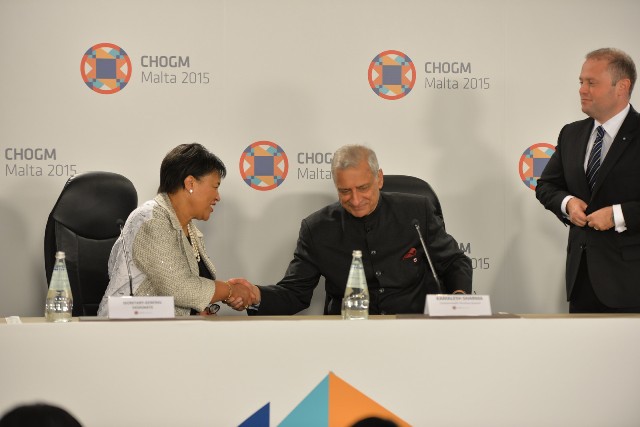 The Commonwealth needs to draw up some rules for choosing its future Secretary-General, and that pressure for this should probably come from civil society. [Photo: CHOGM 2015]
The Commonwealth needs to draw up some rules for choosing its future Secretary-General, and that pressure for this should probably come from civil society. [Photo: CHOGM 2015]
In the Commonwealth, the search is for unanimity or consensus. Arnold Smith emerged as the first Secretary-General, but only after lengthy discussions about how the nature of the Commonwealth Secretariat should develop and the role that the Secretary-General ought to play. In essence, the British, at least as far as the old-school colonial officials were concerned, saw the Secretary-General as a paper and pencil pusher and did not see the need for a man of Arnold Smith’s calibre. Other Heads of Government had very different views and were determined that the Commonwealth Secretariat should be an impartial body responsible to all Heads of Governments collectively and that the Secretary-General needed to be a respected figure who would be given an open door to all member governments. This view eventually prevailed, and Arnold Smith was elected by acclamation for five years, starting at the beginning of July 1965, followed by a second five-year term. He developed the Secretariat and cemented its international status. Sir Shridath Ramphal also emerged by acclamation, with strong advocacy from Canada, and served three five-year terms. During that time, he expanded the Secretariat, an achievement that subsisted until recent years when it has been heavily cut back.
Contest
Since Ramphal, Commonwealth Secretaries-General have emerged after a contest. As Sonny Ramphal’s final term drew to a close two possible candidates emerged, namely Chief Emeka Anyaoku and Malcolm Fraser, and it became clear that an election would be necessary at the 1989 Commonwealth Heads of Government Meeting (CHOGM). Both candidates campaigned vigorously for the post, and it was apparent that African member countries felt it was time for a Secretary-General to emerge from their continent. Chief Anyaoku was well known because of his years as Deputy Secretary-General, followed by a short period as Foreign Minister of Nigeria (which came to an abrupt end because of a military coup, after which he had returned to his old role as Deputy Secretary-General). Malcolm Fraser was also known as he had chaired the Melbourne CHOGM and had been a forceful Prime Minister in the context of Commonwealth affairs. Indeed, Don McKinnon has remarked that some had said that ‘Margaret Thatcher could not stand the possibility of Fraser ringing her up to tell her what to do’ – although authentication may be doubtful. In any event, the issue had to be settled at the ensuing CHOGM, where it is believed a straw poll was used for the first time, and Chief Anyaoku emerged as the clear winner and was then elected unanimously after Malcolm Fraser’s nomination was withdrawn. After that, the UK Prime Minister John Major persuaded colleagues that two terms were enough for any Secretary-General and that four years were better than five in that each term could encompass two CHOGMs. Now CHOGM has been moved, the present Secretary-General’s first term may only cover one CHOGM in 2018, but that problem can easily be overcome by adjusting the present term to end after the Malaysia CHOGM in 2020. That would also enable the four-month interregnum, from the end of CHOGM until the new Secretary-General takes over, to be reduced.
Since then Don McKinnon and Kamelesh Sharma have faced contests, but the process as it stands today remains the same. Candidates must be proposed by a Head of Government, the decision is taken as a first item of closed business, straw polls are held until one candidate receives 50% plus one and the others have had their names withdrawn by their proposers. Only Don McKinnon was challenged second time round, but this had much to do with Zimbabwe and its faltering relationship with the Commonwealth. The candidate was a Sri Lankan, but neither his President nor his Prime Minister were able to be present and the candidate, Lakshman Kadirgamar, was also absent, so his candidacy made little progress despite support from Zimbabwe. On one occasion, the Head of a Commonwealth Organisation put his name forward and campaigned very hard. His country already had a candidate in the field, and when the out-going Secretary-General asked if any other Head of Government was prepared to act as proposer no offers were forthcoming, which was hardly surprising as the old school always sticks together in such circumstances. The Malta CHOGM produced three strongly supported candidates.
Two of these were Caribbean nominees, namely Sir Ron Sanders (Antigua) and Baroness (Patricia) Scotland (Dominica), and the third was Mmasekgoa Masire-Mwamba (Botswana). All three conducted active campaigns, but the ultimate decision was made at the beginning of CHOGM in Malta through a series of straw polls. After the first withdrawal, Mmasekgoa Masire-Mwamba was narrowly pipped at the post by Patricia Scotland who was then elected formally and, in the words of the communique, by consensus.
In both the Commonwealth and the United Nations, it remains the case that it is the politicians egged on by their senior diplomats that decide, and nothing is likely to happen to bring about any change in that regard. The process may be transparent in that it has become clear how it works, but what has become apparent from Malta and New York is that those with control are reluctant to let go even though there has been some concession made to civil society. It is in the realm of civil society where seeds of change may lie.
Mark Robinson has worked with the Commonwealth, the United Nations and has served as an MP in the UK. He is currently a member of the Round Table Editorial Board.



